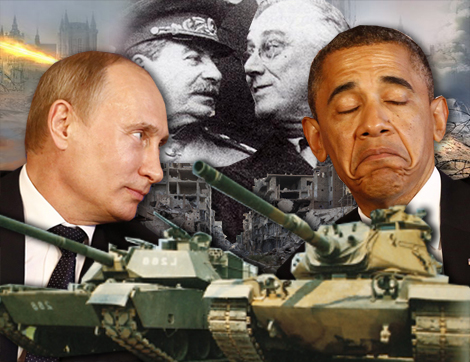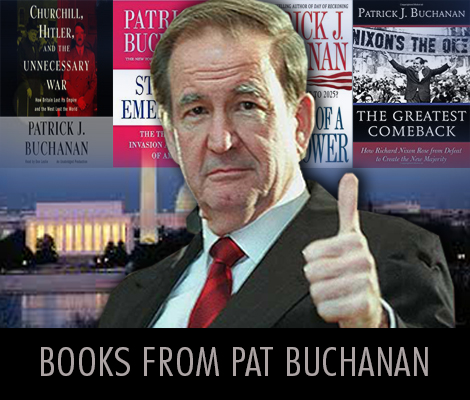
Why does the U.S. establishment in Washington, D.C. despise Vladimir Putin? Sen. John McCain (R-Ariz.) goes apoplectic when he hears someone say the name, “Putin.” In truth, the U.S. and Russia should be on the same side. Instead, Washington elites insist on playing chicken with the world’s second most powerful nuclear power. Why?
By Patrick J. Buchanan
Since Donald Trump said that if Vladimir Putin praises him, he would return the compliment, Republican outrage has not abated. Arriving on Capitol Hill to repair ties between Trump and party elites, Gov. Mike Pence was taken straight to the woodshed. Sen, John McCain (R-Ariz.) told Pence that Putin was a “thug and a butcher,” and Trump’s embrace of him intolerable.
Said Sen. Lindsey Graham (R-S.C.): “Vladimir Putin is a thug, a dictator…who has his opposition killed in the streets,” and Trump’s views bring to mind Munich.
Putin is an “authoritarian thug,” added “Little Marco” Rubio (R-Fla.).
What causes the Republican Party to lose it whenever the name of Vladimir Putin is raised?
Emigrate While You Still Can! Learn More . . .
Putin is no Stalin, whom FDR and Harry Truman called “Good old Joe” and “Uncle Joe.” Unlike Nikita Khrushchev, he never drowned a Hungarian Revolution in blood. He did crush the Chechen secession. But what did he do there that General Sherman did not do to Atlanta when Georgia seceded from Mr. Lincoln’s Union?
Putin supported the U.S. in Afghanistan, backed our nuclear deal with Iran, signed on to John Kerry’s plan that ensured a limited cease fire in Syria and military cooperation in the hunt for ISIS and al-Qaida terrorists.
Still, Putin committed “aggression” in Ukraine, we are told.
But was that really aggression, or reflexive strategic reaction?
We helped dump over a pro-Putin democratically elected regime in Kiev, and Putin acted to secure his Black Sea naval base by re-annexing Crimea, a peninsula that has belonged to Russia from Catherine the Great to Khrushchev. Great powers do such things.
When the Castros pulled Cuba out of America’s orbit, did we not decide to keep Guantanamo, and dismiss Havana’s protests?
Moscow did indeed support secessionist pro-Russia rebels in East Ukraine.
But did not the U.S. launch a 78-day bombing campaign on tiny Serbia to effect a secession of its cradle province of Kosovo?
What is the great moral distinction here?
The relationship between Russia and Ukraine goes back to 500 years before Columbus. It includes an ancient common faith, a complex history, terrible suffering and horrendous injustices — like Stalin’s starvation of millions of Ukrainians in the early 1930s.
Yet, before Bush II and Obama, no president thought Moscow-Kiev quarrels were any of our business. When did they become so?
Russia is reportedly hacking into our political institutions. If so, it ought to stop. But have not our own CIA, National Endowment for Democracy, and NGOs meddled in Russia’s internal affairs for years?
Putin is a nationalist who looks out for Russia first. He also heads a nation twice the size of ours with an arsenal equal to our own, and no peace in Eurasia can be made without him.
We have to deal with him. How does it help to call him names?
And what is Putin doing in terms of repression to outmatch our NATO ally, Turkey’s Recep Tayyip Erdogan, and our Arab ally, Egypt’s General el-Sissi?
Is Putin’s Russia more repressive than Xi Jinping’s China?
Yet, Republicans rarely use “thug” when speaking about Xi.
During the Cold War, we partnered with such autocrats as the Shah of Iran and General Pinochet of Chile, Ferdinand Marcos in Manila, and Park Chung-Hee of South Korea. Cold War necessity required it.
Scores of the world’s 190-odd nations are today ruled by autocrats. How does it advance our interests or diplomacy by having congressional leaders yapping “thug” at the ruler of a nation with hundreds of nuclear warheads?
Where is the realism, the recognition of the realities of the world in which we live, that guided the policies of presidents from Ike to Reagan?
We have been told by senators like Tom Cotton that there must be “no daylight” between the U.S. and Israel.
Fine. How does Israel regard Putin “the thug” and Putin “the butcher”?
According to foreign policy scholar Stephen Sniegoski, when Putin first visited Israel in 2005, President Moshe Katsav hailed him as a “friend of Israel” and Ariel Sharon said he was “among brothers.”
In the last year alone, Bibi Netanyahu has gone to Moscow three times and Putin has visited Israel. The two get along wonderfully well.
On the U.N. resolution that affirmed the “territorial integrity” of Ukraine, Israel abstained. And Israel refused to join in sanctions against a friendly Russia. Russian-Israeli trade is booming.
Perhaps Bibi, who just got a windfall of $38 billion in U.S. foreign aid over the next 10 years from a Barack Obama whom he does not even like, can show the GOP how to get along better with Vlad.
Lindsey Graham says that the $38 billion for Israel is probably not enough, that Bibi will need more, and that he will be there to provide it.
Remarkable. Bibi, a buddy of Vlad, gets $38 billion from the same Republican senators who, when Donald Trump says he will repay personal compliments from Vladimir Putin, gets the McCain-Graham wet mitten across the face.
Pat Buchanan is a writer, political commentator and presidential candidate. He is the author of The Greatest Comeback: How Richard Nixon Rose From Defeat to Create the New Majority and Suicide of a Superpower: Will America Survive to 2025?
COPYRIGHT 2016 CREATORS.COM


Myasswash…whatever…it’s been a while since I read something as idiotic and uninformed as the garbage you just posted. How dumb are you, seriously? Mainstream media at its best. Just go and die somewhere, uninformed retard.
Mohogwash is a real hogwash and crowned yankee idiot who knows shit about Russia, Putin and politics there…An usegul zionist goy-sheep…
Buchanan certainly knows his history, but drawing on historical events to beg the argument that ‘Awe,shucks, folks: Putin’s not so bad’ doesn’t close the deal.
The facts are that Putin is an unpredictable adversary, who:
– has quashed the democratic reforms in Russia following the collapse of the Soviet Union, and wrestled control to become the defacto Russian Dictator for life
– murders/poisons his political opponents
– invades the internationally recognized borders of neighboring countries like Ukraine
– annexes their sovereign territory
– foments and actively/covertly supports internal military separatist aggression in eastern Ukraine
– shoots down commercial passenger planes full of innocent civilians and then lies about his complicity and attempts to cover up his tracks
– is threatening the invasion of the free and democratic Baltic nations of Latvia, Lithuania and Estonia
– has adopted a “first strike” nuclear attack policy for Russia
There is no doubt that Putin is an unpredictable, reckless, lawless “thug and a butcher”.
Buchanan’s defense of Putin is essentially “there’s been worse”, “he’s not alone”, “we’ve ignored/overlooked worse in the past” and “he could be and do worse”.
The examples Buchanan presents of certain senior people in government who openly name-call Putin, people who know better how to make diplomacy work, are edifying, and he provides sound advice for their consideration.
However, none of Buchanan’s arguments/moral equivalencies excuse Putin for his lawless, reckless, unpredictable murderous behavior.
Would Buchanan be a similar apologist for the US government if suddenly it started acting the way Putin does? I hope not.
A suggestion for Mr.Buchanan: Break this article up into two more detailed articles:
– One article which exemplifies the sub-optimal/inappropriate communications tactics of certain un-diplomatic American politicians, and advise them on how to communicate more effectively.
– Another article which exemplifies the nefarious and unpredictable characteristics of Putin, and suggests reasoned ways to optimally and effectively counter and respond to them.
I’m not against Putin. But he’s not as good as he pretends to be. Russians pretendi the sun shines out of Putin’s arse. Russia, the land of make-believe.